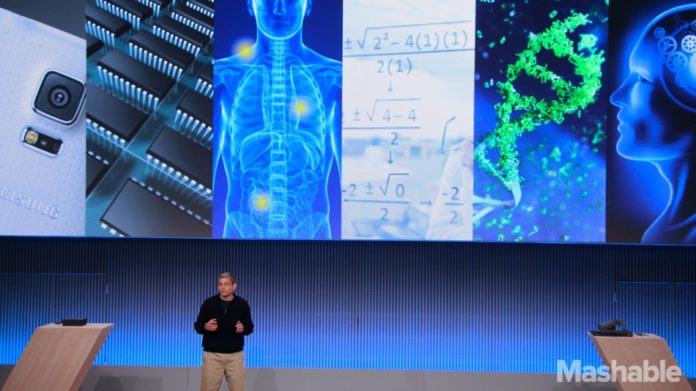Samsung’s health ambitions go way beyond wearables

Samsung is probably not the first company that comes to mind when you think of healthcare.
Seeing the electronics giant release an experimental health-centric wearable took many by surprise. But as Samsung continues to push into the health market, there’s a lot more to its plan than fitness trackers and smartwatches.
The Simband and the Sami platform behind it signal a bigger shift within the company as it looks to broaden the reach of its hardware beyond day-to-day convenience.
Among the slew of announcements made during its developer conference in San Francisco this week was a new digital health platform — an overarching effort to help developers create new ways to track health information using the company’s sensors and devices.
Samsung’s Digital Health Initiative comprises two parts: The consumer-facing side, which includes the S Health platform announced earlier this year; and the research-focused side, which includes the sensor-filled Simband and the Sami platform that powers it.
“We believe healthcare monitoring technology will encourage preventive healthcare,” Samsung President Won-Pyo Hong said during Wednesday’s keynote.
That may not sound like a particularly bold statement, but it represents a significant shift, one that could set Samsung apart from competitors in the healthcare space. If the company does indeed move toward using its tech for preventive healthcare — rather than recreational data collection and tracking — it could change how consumers use their products.
“We know that wearables help us better monitor physical activity, but this is only one element of a digital health ecosystem,” Hong said. “Samsung’s digital health platform will help app developers, healthcare providers, hospitals, insurance and the pharmaceutical companies drive in an open environment that connects sensor technologies, devices and partners.”

Samsung’s research-focused Simband has six sensors that can track a wealth of bodily information but the company’s approach to health isn’t just about wearables.
Image: Mashable, Karissa Bell
Samsung is not the only company trying to establish itself on this front. Apple is also working on its own health platform with Healthkit. As it stands now, Healthkit is more a filing system for data collected by health and fitness apps, rather than a full-fledged ecosystem— though Apple’s Health app certainly stands to evolve once the Apple Watch is available and integrated into the platform.
And Samsung’s strategy is about much more than wearables alone. Each side of the company’s health efforts is based on an open platform that enables partnerships between developers, hardware makers and researchers. An emphasis on openness is a big part of what differentiates Samsung’s approach from others.
“They are coming in very aggressively with an open API platform,” Dr. John Mattison, chief information officer at Kaiser Permanente, told Mashable. “There’s no question that when you embrace a developer community with an open platform like Android, and you build on top of that increasing levels of open APIs, you liberate innovators to accelerate their innovation.”
And when you combine an open developer-friendly environment with advanced sensors and tracking capabilities, this creates new opportunities for wearables to move beyond data collection alone. The key, Mattison said, is to be able to contextualize information for users and make data accessible for healthcare providers. If Samsung and others can successfully make this shift, then these platforms suddenly become much more powerful than step-trackers or diet aids.
“We don’t need digital nannies,” Mattison said, saying that many wearables seem to collect information without adding value. “We need wearable sensors that help with mindfulness. If it doesn’t impact a decision, if it doesn’t change your behavior toward a healthy behavior, then it’s not going to impact your health in the long term.”
It’s still too early to know how Samsung’s — or its competitors — efforts will pan out. Much depends on the success of the still nascent developer ecosystem and how the health care industry responds to these advancements.
But Samsung’s emphasis on encouraging innovation by making its platforms accessible to developers stands to benefit everyone involved— and that’s a very good thing.
Have something to add to this story? Share it in the comments.
